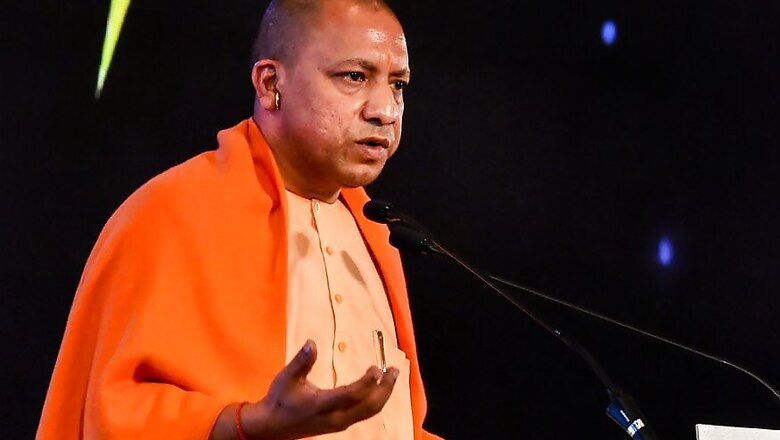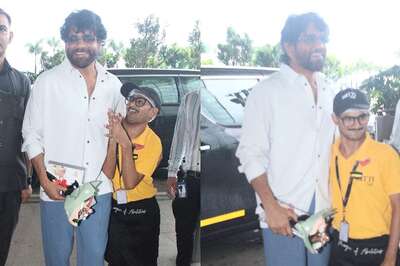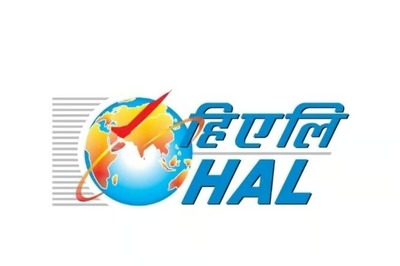
views
New Delhi: Uttar Pradesh Chief Minister Yogi Adityanath was reprimanded sharply by the Election Commission on Friday, five days after he referred to the Indian Army as “Modiji ki Sena” or Prime Minister Narendra Modi’s army at an election rally in the state.
“Be careful in your utterances in the future,” Adityanath was cautioned by the poll panel.
This is not it. NITI Aayog Vice-chairman Rajiv Kumar also violated the Model Code of Conduct by speaking against the Congress’ NYAY or minimum income guarantee scheme, the Election Commission said on Friday, rejecting his reply as unsatisfactory. The poll body said that it had conveyed its displeasure to Kumar.
This soon led the Congress to cast aspersions on the poll body. “Has the MCC now become ‘Modi Code of Conduct’? Adityanath insults the Indian Army — EC writes a love letter to him,” Congress’ chief spokesperson Randeep Surjewala wrote on Twitter.
But could the Election Commission have done something more than a mere slap on the wrist? Perhaps not, especially when proposals to reform laws around this area have been either rejected or been kept pending for decades.
While delivering a public lecture in 2011, former chief election commissioner (CEC) N Gopalaswami had said that a proposal made by the EC in 1998 to enable it to issue orders regulating registration and de-registration of political parties was gathering dust at the Union Ministry of Law and Justice.
Referring to political parties and their various undemocratic tactics to win elections, Gopalaswami had said, “The number of registered parties steadily rose after 2003 and, at one point of time, the commission used to receive applications every week for new registration.”
A set of 22 proposals for electoral reforms was sent to the Centre in 2004, which a year later was referred to the standing committee of personal, public grievances, law and justice.
The Ministry of Law and Justice in December 2010 said it was worthwhile to consider the proposal and three years later, the ministry’s report on electoral reforms recommended that the EC must be conferred with the power to de-recognise political parties on account of violation of Model Code of Conduct. Even the Law Commission of India made a similar suggestion.
In 2016, the commission on its own accord launched an initiative to identify registered, unrecognised political parties, which did not put up any candidate during elections between 2005 and 2015.
If one thinks that it’s Adityanath or Kumar who for the first time have been asked to toe the line, then that’s not the case.
In 2017, the EC had given three instances of wild allegations. The first one was Delhi Chief Minister Arvind Kejriwal referred to the poll body as ‘Dhritarashtra blindly helping son ‘Bharatiya Janata Party (BJP)/Duryodhana win elections with the help of Electronic Voting Machines that had allegedly been tampered with’.
Secondly, Manish Tewari of the Congress had accused the EC of becoming an “advocate of EVMs” trying to “bulldose the challenging political parties”.
This was not all, Kejriwal had even cast aspersion on Election Commissioner OP Rawat, which made the latter distance himself from the 21 AAP MLAs’ ‘office of profit’ case.
It was at this time that the commission had written to the Ministry of Law and Justice seeking powers to move against those who are disobedient to its orders or who are disrespectful to its authority.
The EC had requested the ministry to amend the Contempt of Courts Act, 1971, to empower it against those who malign the constitutional position it holds.
The accompanying explanation spelled out contempt as the ‘wilful disobedience to any instructions, directions, order or opinion passed by the commission or wilful breach of an undertaking given to the commission’. Further, it includes any word or action that ‘scandalises or lowers the authority of the commission’.
However, like all other demands for more teeth, this too was never acted upon.
The Election Commission has continued to demand for more power even though it has always been either rejected or pushed inside voluminous files.
In 2017 again, when the country was in a complete election mode, Chief Election Commissioner Nasim Zaidi had stated that despite being rejected twice by the government, the EC continued to demand for the power to cancel an election in case of voter bribery.
According to a report, Zaidi who was going to retire from his post in four months, said the amount of cash and liquor seized from Uttar Pradesh, Uttarakhand, Manipur, Punjab and Goa during the ongoing assembly elections had been over three fold the volumes that were seized from these states when they went to polls in 2012.
Zaidi had then remarked that the situation could have been avoided. He had stated that the government could have done more to give effect to pending electoral reforms. He had also called for a separate provision in the Representation of the People Act to deal exclusively with hate speeches during poll campaigns and time-bound disposal of election petitions by courts.
In 2017, BJP MP Varun Gandhi had called the poll body a “toothless tiger.”
“One of the biggest problems is the problem of the Election Commission which is really a toothless tiger. Article 324 of the Constitution says it (EC) controls and supervises elections. But does it really do that? It does not have the power to file cases once elections are over. It has to go to the Supreme Court to do so,” Gandhi had said.
Still the pursuit went on. In February, 2018, the EC, in an affidavit to the Supreme Court, had said it must be empowered to deregister a political party if it violates provisions of the Constitution.
The poll panel’s affidavit was in response to a public interest litigation (PIL) that sought to bar politicians convicted for a crime from forming a political party.
The EC did not support the petition, but referred to various measures it had initiated in the past to decriminalise Indian politics. However, it agreed with the petitioner’s concern that “inner party democracy” is “absolutely essential” for the country, for which the EC can frame suitable guidelines only if the law is amended to empower the poll panel.
The penchant for having more teeth to counter flow of black money into polls was something the commission had even sought to address by suitable amendments to the Representation of People Act.
In June 2016, the poll body had written to the Centre seeking amendment to the act to confer specific powers on the election watchdog to postpone or countermand polls based on evidence that money power was used to influence voters.
The move had come days after the EC rescinded the poll notification for two Tamil Nadu Assembly constituencies, Aravakurichi and Thanjavur, following reports of large-scale distribution of money and gifts to voters by the candidates and political parties. The action was taken under Article 324 of the Constitution.
“However, currently, there is no specific provision in the law to this effect. The constitutional provisions need to be invoked sparingly. Therefore, we have sought insertion of a clause empowering the EC to take action in case there is evidence proving that money was used to influence voters,” a poll panel official had said.
In a letter to the legislative secretary in the law ministry, the commission said a new clause ‘58 B’ be inserted in the act to allow adjournment or countermanding of election in the affected polling areas on the grounds of use of money power.
Let alone powers to deal with poll code violations or use of cash to purchase votes stringently, the commission was also criticised as it sought more power to regulate content over social media platforms.
In February this year, industry and civil society organisations had opposed the Election Commission’s demand to include a clause in the proposed changes to the country’s technology laws that deal with taking down content hosted on social media, messaging services and other online platforms.
The proposed changes include asking companies to notify users about their privacy policies at least once every month, assisting a government agency in an appropriate manner within 72 hours of communication and take down or disable access to the content specified by the draft law.
In its comments made to the Ministry of Electronics and Information Technology as part of the consultation, the EC has asked that a clause be added to the proposed rules so they apply to “violation of any of the provisions of election law or/and directions of the Election Commission, during the period of any election”.
In counter-comments submitted by different stakeholders, several entities disagreed with the EC’s demand and said the existing laws were enough to deal with electoral processes and do not require a modification in the IT Act.
This ideally proves that attempts made by the commission to have more powers to truly function as an independent platform has only been a dream with the executive and judiciary failing to realise that the commission must have basic plenary powers to hold the violators guilty.




















Comments
0 comment